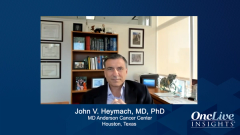
Immunotherapy in NSCLC With Classical EGFR Mutations or ALK Rearrangements
A brief review of the lack of efficacy seen with immunotherapy approaches in patients with EGFR-mutated or ALK-rearranged non–small cell lung cancer.
Episodes in this series

Transcript:
Ticiana A. Leal, MD: Let’s talk about whether there’s a role for immunotherapy in non–small cell lung cancer harboring molecular alterations, and specifically for patients with EGFR and ALK. In the NCCN [National Comprehensive Cancer Network]guidelines, there is language about contraindication for treatment with PD-1 and PD-L1 inhibitors if there is the presence of an oncogene such as EGFR exon 19 deletion, L858R,or ALK rearrangements, which could predict lack of benefit from immunotherapy. This is based on data that we have. A lot of it is retrospective in nature, but I think certainly it is convincing that there is a lack of benefit for patients with EGFR and ALK. One of them is a study that was initially published in 2018, which was a really well-done meta-analysis and systematic review, where they included the major clinical trials in the phase 3 setting comparing a checkpoint inhibitor—nivolumab, pembrolizumab, or atezolizumab—with docetaxel. What they saw was those checkpoint inhibitors compared with docetaxel were associated with detriment and lack of benefit for patients with EGFR mutations.
There was another study from the IMMUNOTARGET registry, looking at immune checkpoint inhibitors for patients with advanced non–small cell lung cancer. This was a global study looking at 551 patients treated in 24 centers, from 10 different countries. What they saw was that for patients with molecular alterations, and they looked at KRAS, EGFR, BRAF, MET, HER2, ALK, RET, ROS1, and multiple drivers, there was a lack of benefit for patients with certain actionable mutations, such as a lack of response in the ALK group. In addition to that, we have another study that was also retrospective in nature. It was a smaller study, with about 58 patients treated with PD-1/PD-L1 inhibitors, and it looked at patients with EGFR and ALK. What they saw, again, was the consistent trend we’re talking about, that patients who had non–small cell lung cancer harboring an EGFR mutation or ALK rearrangement did not have benefit from PD-1/PD-L1 inhibitors, and had a low overall response rate to PD-1/PD-L1 inhibitors.
What are the implications of this evidence? I think the implications are quite clear with the evidence that we have. For patients with sensitizing EGFR mutations and ALK rearrangements at initial diagnosis, the way to get the best outcomes is going with targeted therapy. Certainly, immunotherapy has limited efficacy and should not be used as the initial therapy for patients with EGFR mutations and ALK rearrangements.
Transcript edited for clarity.









































